5 ways you can give back to your community (even under lockdown)
Something I’m working to do more of this year is contribute more to my local community and those with less. If 2020 taught me anything, it was that local resilient communities are so important for those that live in them, and the support networks that a good community can offer are priceless.
The other lesson was that, no matter how hard you think you’ve got it, someone else has got it worse, and almost all of us have privilege that we can use to benefit those with less.
(Privilege, incidentally, doesn’t just mean the more obvious things like time or money or power. It can mean white privilege, male privilege, cisgender privilege, able-bodied privilege, educational privilege, mental health privilege, and so on. We might not have them all, but even having one or two makes life easier for us than those who lack them.)
What this ‘contributing’ looks like will vary from person to person – it depends on our privilege, after all. But there are lots of ways we can benefit others and support our community. It doesn’t need to be big or grandiose. Small actions are just as important.
Something so small it only makes a difference to one person still makes a difference to that person.
Here are five ways I’m trying to give back to my community, and contribute more.
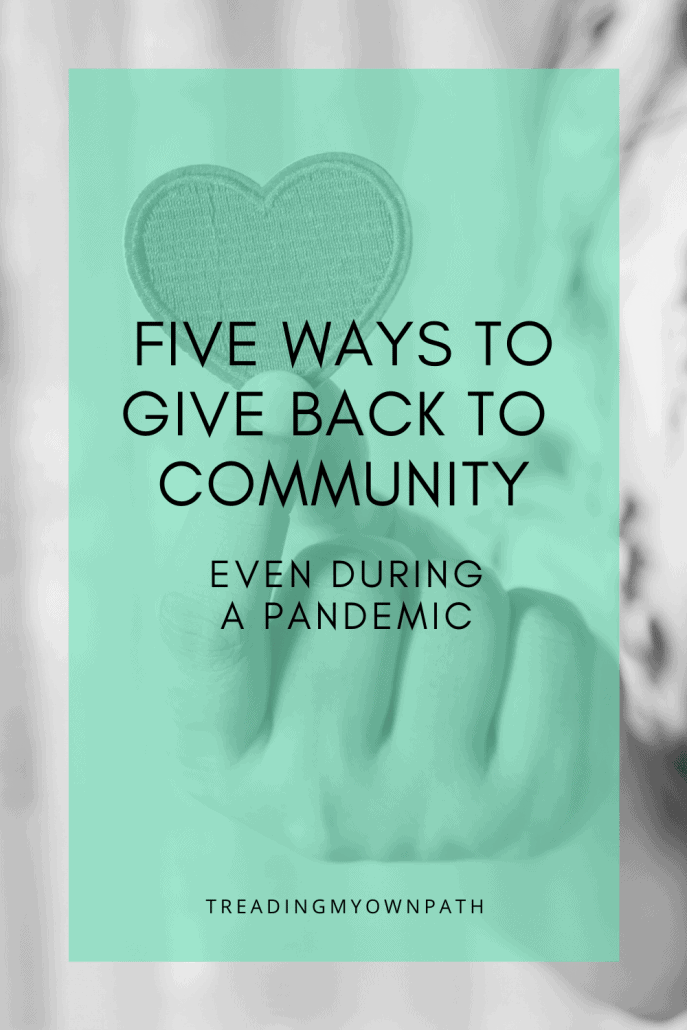
Picking up litter
It might seem small, but litter (or lack of it) has such an impact on a community. Rubbish strewn across a park or in waterways is unsightly and harms wildlife but it also gives the impression that no-one cares about the area. And if somewhere is already covered in trash, it almost gives the go-ahead for more trash to be added.
If you want to instantly improve your local community, commit to picking up litter.
It might be that you just try to pick up three items every time you leave the house. Or you might join an organised clean-up event once a month, or even just once a year, where you collect rubbish as part of a group. Or you might decide to ‘adopt a spot’ and keep that one area trash-free.
In Western Australia our container deposit scheme launched at the end of 2020. This means most beverage containers can be returned to receive a 10c refund. Whenever I’m out on my bike, I pledge to pick up every container I see. I’d say on most trips I find 2-3 containers. The funds are going towards a community replanting project in the local area.
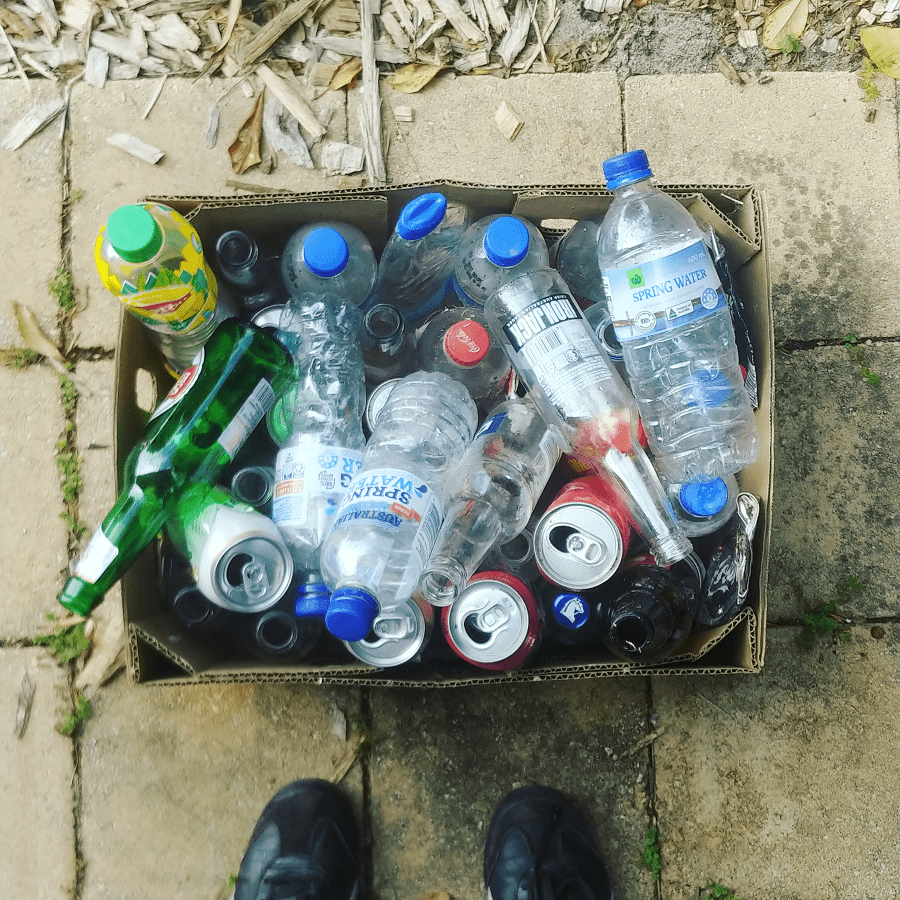
And yes, I feel guilty about all the other litter I see and leave when I’m out on my bike. But the reality is, if I stopped to pick up everything, I’d never reach my destination. So I focus on the containers (which is more than I used to do) and accept that I can’t do everything.
In March every year there is a national ‘Clean Up Australia Day’ event. So this year I got together with some like-minded neighbours and we organised a Clean Up Carlisle event, picking up litter along the train line. It’s the first time I’ve ever organised a clean-up like this myself – so it was pretty exciting that people outside of our group turned up!
When I was talking to my neighbours about the event afterwards, they were annoyed that we hadn’t decided to choose one of the main roads in the area, which also has a litter problem. And so I suggested another event, to come soon. When people take pride in their community, these things start to happen…
Donating what you no longer need
I’m a huge fan of donating stuff we no longer need – or more accurately, finding new owners and homes for our old things. It’s one of the things I talk about in a lot of detail in my book Less Stuff.
I have mixed feelings about donating to the charity shop. Too many people use charity shops as a dumping ground for stuff they feel guilty about throwing away. Charity shops are overwhelmed with stuff, only selling about 15% of everything that gets donated.
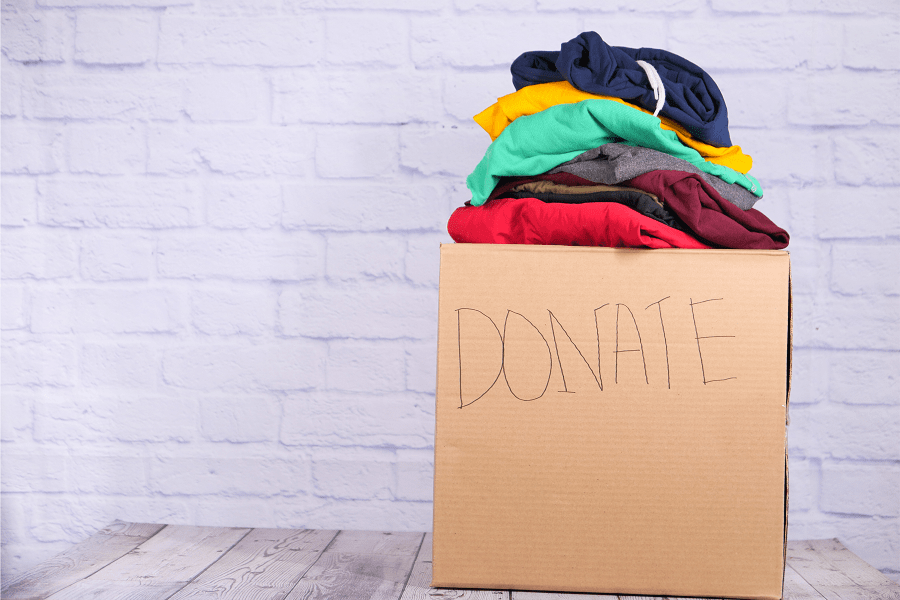
If you’re going to donate to the charity shop, ensure it’s your best stuff, its clean and not broken, and it’s appropriate for the time of year (charity shops don’t want Christmas decorations in January, or ski ware in summer). You can even call before you drop off to check it’s stuff they actually need right now.
Charity shops are an easier option, but there are lots of other places to donate items to people who need them.
Try your local Buy Nothing group.
Ask on a local community Facebook group for ideas of local places to drop things off (such as homeless shelters or refuges, community projects, schools or playgroups).
If you have excess food (even if it’s open or past its expiry) try Olio. They’ve recently expanded into non-food items, too.
Givit is an online Australian platform which lists items needed by individuals or organisations.
Supporting a local food bank
Food banks often have specific needs and won’t accept items that are open or past their use-by (use Olio for these things). You might have items in your cupboard to donate, or you might decide to make a donation by buying extra groceries.
I found a local food bank run by church just two streets away from me, and I started the habit of making a monthly donation box at the end of last year. Being local I like that it benefits people in my area. Every time I got to the shops I’ll buy a few things to add to the box, and then once a month I make a delivery.
It felt strange to me to buy items in packaging at first, but I feel better about supporting the food bank than I would if I avoided the groceries and didn’t contribute. I still try to keep to my values where I can – buying Fairtrade coffee and locally grown tinned vegetables.
Something else I’ve been able to do, and this might work for you if you don’t have the budget to contribute financially, is take food that’s been offered up on the Buy Nothing group to the food bank on behalf of others.
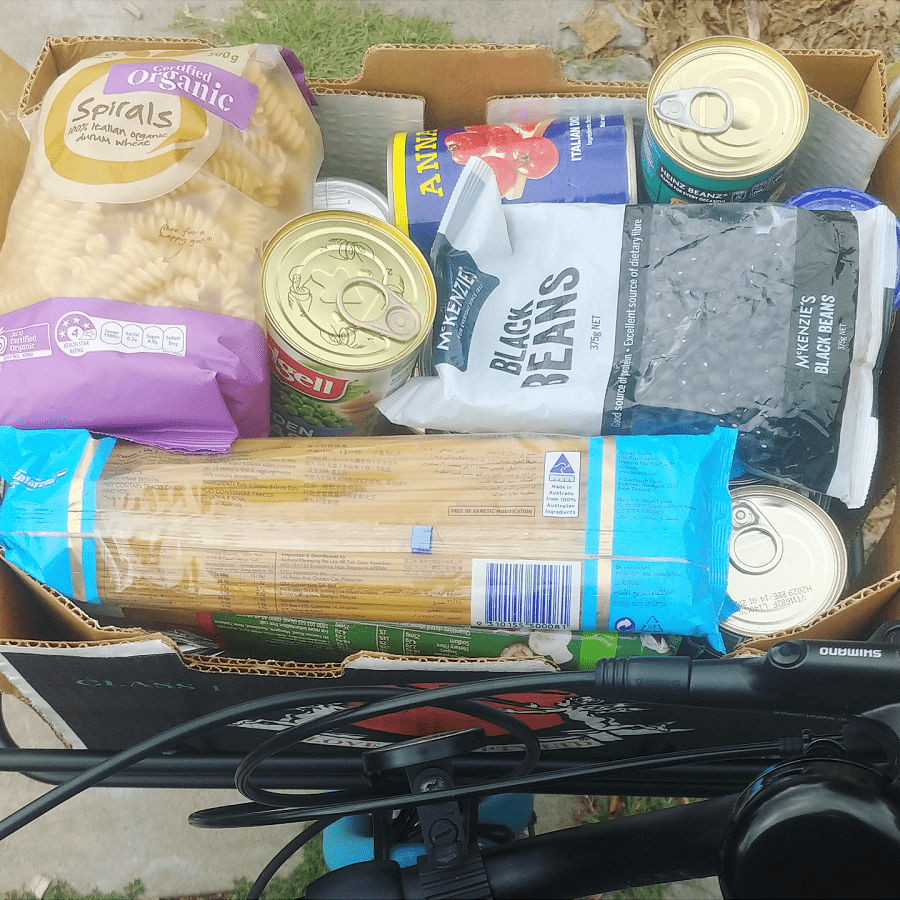
(The drop off hours are quite specific, being Wednesday and Friday mornings only, so not everyone can get there. I have flexible working hours and can pick things up and drop them off.)
I want to add, that the very fact that food banks need to exist at all is quite outrageous. In a world where 1/3 of all food grown is thrown away, the fact that millions of people go hungry in countries like the UK, Australia and the USA (so called ‘developed’ countries) every day is quite unbelievable.
Our food system is in crisis, and there is a lot of work to be done by corporations and governments to stop allowing this waste on this scale and to redistribute resources more fairly. In the meantime, people need to eat and donating to food banks is one way to share our resources with others.
Making a monetary donation
The obvious one, possibly. But making monetary donations to organizations you believe in and/or whose work you value – whether it’s a regular donation or a one-off, whether it’s a small or large amount, whether it’s a big organisation or a small community project – is always going to be of value to them.
I want to get better at this. It’s easy to get stuck the rabbithole of where’s best to donate, which type of organisation, how do I know my donation will be effective, am I making the best choice etc etc.
To get unstuck, I’m learning to let this whole idea of ‘best’ go. Donations are more than money, anyway. They are a show of support and belief in the work.
My new rule is, don’t fixate on what’s ‘best’. If a donation drive crosses your path and it’s something you believe in and you can spare a few (or many) dollars, make a donation.
You might not be able to spend that money on cupcakes any more, but that wasn’t going to make the world a better place either.
I make a monthly donation to IndigenousX, who fund and give a platform to Aboriginal and Torres Strait Islander voices across Australia. I’ve learned so much through their writing.
Because I’m self-employed and my income isn’t regular, I don’t commit to regular monthly donations other than this – although I have plans to when I can. I made a donation to the Indigenous Literacy Foundation on my birthday, I made a donation to Boorloo Justice (Boorloo is the Whadjuk name for Perth) for their Decolonise Pride fundraiser, I supported the Learn Our Truth crowdfunding campaign organised by the National Indigenous Youth Education Coalition and In My Blood It Runs.
I also purchased a photo print that was a fundraiser for the National Suicide Prevention and Trauma Recovery Project. (Does that count?)
And at the other end of the scale, I supported a local community garden in their fundraiser to get new chickens.
Making an in-kind donation
You might not have money to donate, but you might have a product or service you can donate. I’ve donated copies of my books to the Hilton Harvest community garden, and Free the Hounds (a greyhound charity) simply because they reached out to ask me – and I like gardening and greyhounds!
If you’re a writer, needleworker, an artist or some other creator, maybe you can offer your creations to organisations to help them with their fundraising efforts.
Volunteering your time
If you don’t have money but you do have time, maybe volunteering is for you. Volunteering can mean so many things, from getting out and about and hands-on to helping with social media. It can be a regular commitment, or one-off jobs as required.
It can be helping an established organisation, an informal local group or even helping one person (for example, with their weekly shopping).
In the past I’ve volunteered for not-for-profit organizations, but currently my focus is on much more local activities – such as hosting the community Grow Free cart and helping get our new community Street Activators group up and running.
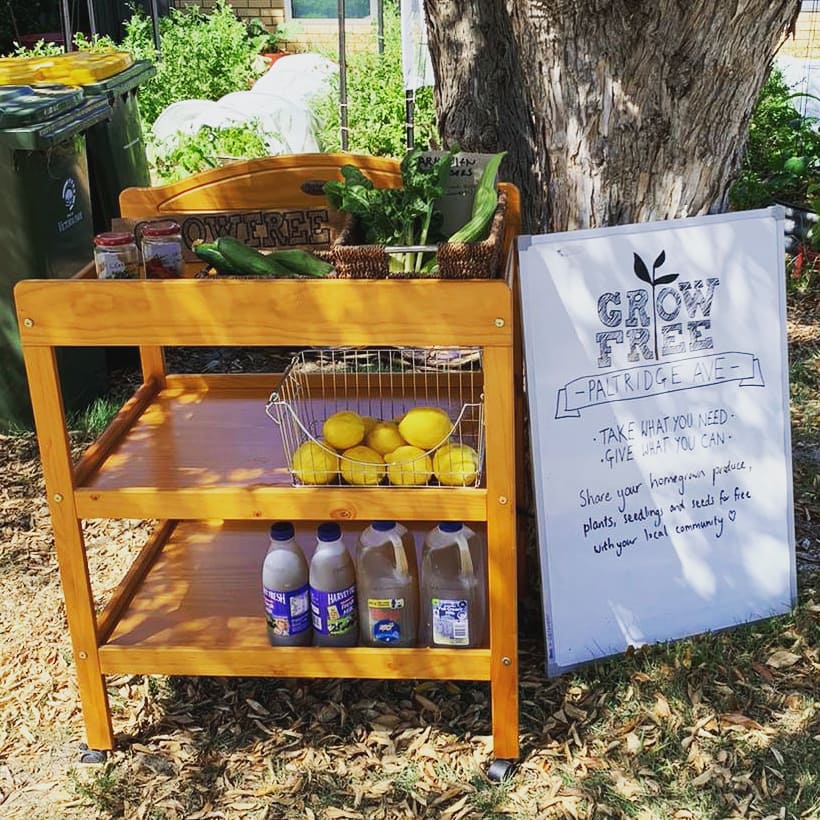
I also admin a couple of zero waste Facebook groups.
My energy, enthusiasm and time for volunteering ebbs and flows, and right now this is all I have the capacity to do. But I’d love to volunteer at the Food Rescue place sometime in the future.
…
2020 (and 2021) have left me feeling a little bit ‘stuck’. Unsure where I want to concentrate my focus, and unsettled by all of the change. Simple acts like picking up litter, buying some (plastic-free) teabags at the grocery store to give to the food bank or making a donation to a group whose request popped up in my feed are tangible things that I can do, today, in the moment, to help make things a little bit better.
As Anne Frank said, no-one has ever become poor by giving.
[leadpages_leadbox leadbox_id=1429a0746639c5] [/leadpages_leadbox]
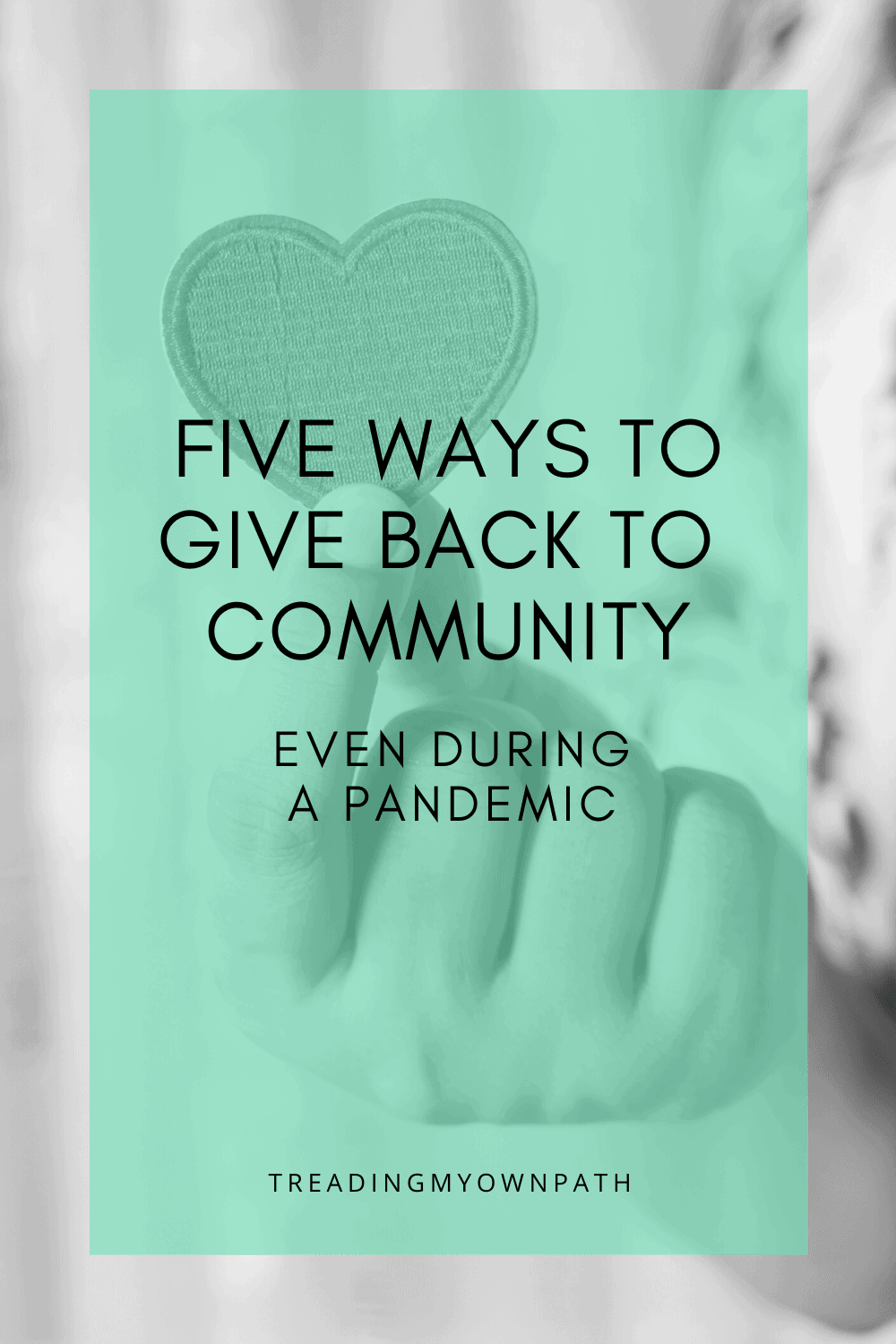
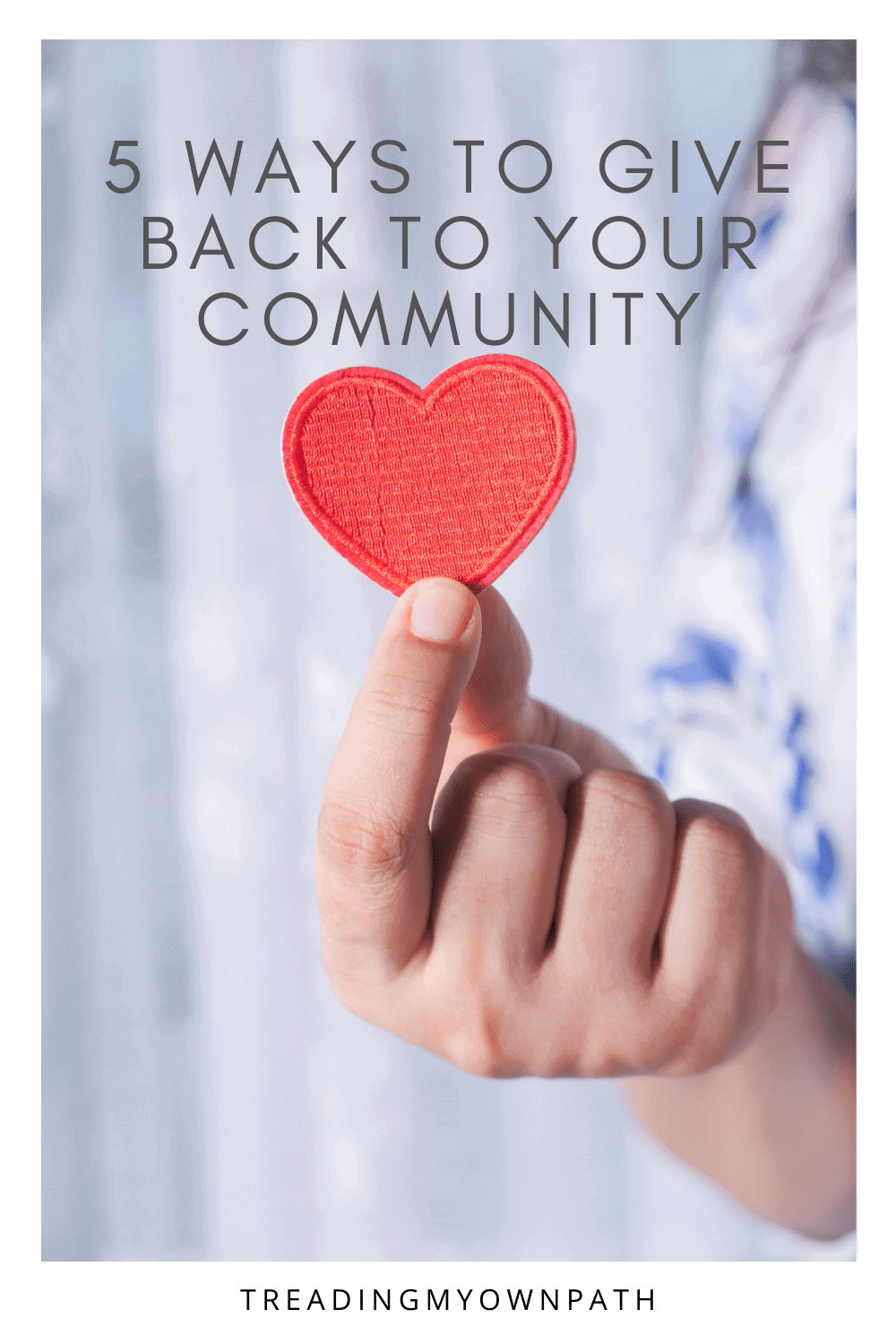






Stuck and unfocused is exactly how I have been feeling the last few months, too. There’s some great ideas here, so thanks for sharing!
It’s not a particularly fun place to be, Emma – at least it hasn’t been for me. But finding out about places and people doing good stuff and being able to support them, and trying to share more, definitely makes me feel more positive both in myself and with the world!
Wow this post really does resonate with me, I’ve been trying to look at ways to get involved more in my community, donate and give my time and I keep getting stuck with what’s “best” exactly that! This has helped give me some direction thank you!
I’m glad it helped, Alex! I think anything we do is better than doing nothing. And maybe not all projects are destined to succeed, or do as well as they might want to, but we have to believe in stuff to help others move forward with it and there’s still lessons and learnings for people involved even when things don’t go to plan. I don’t want to use things like this as an excuse for inaction on my behalf!
these are all great ideas, and i have to say the need is huge, at least where i live. since our government chose not to support its citizens in any substantial way under the financial challenges of covid, many people who normally manage are not managing well, and those who were struggling financially already are in desperate need. i joined the local ‘buy nothing’ group a couple of years ago, and lately there has been a big uptick in appeals for child related things: baby milk/formula foremost, breast pumps and bottles, diapers, baby clothing, cot bedding, prams, car seats, and toys/books are all in high demand and snatched up quickly. food vouchers or coupons are popular, too.
likewise, our local food banks have been unable to keep up with demand over the past year+, and are facing critical shortages. i’m trying to bring this to the attention of various groups and individuals locally, as my own contributions are limited by finances. church pantries report the same draw-down, and our social services are limited at best. people really are in need.
thanks for posting about the importance of community generosity.
We’ve been really lucky here that Covid has not affected us (our state) nearly as much as anywhere else in the world, and whilst there are still many people left worse off it I can only imagine how these long lockdowns and restrictions have affected people on a huge scale elsewhere. As you say, the need is huge. But sometimes it is helpful to not think about the ‘huge’ (which can be overwhelming and make us feel like our actions are insignificant because of the scale) but to focus on what we can do to help our local communities. Even one family, or one person.
I hope if there’s one good thing that comes out of Covid it’s that people really recognize the need to support their neighbours and communities.
thank you for the great ideas. I have committed to donating to a different charity each fortnight (pay day). I wrote a list of the key issues i want to support (First Nations people, Refugees & Human Rights, Environment, Women, People living with disabilities) and then researched different charities that work in these areas. I prefer to support smaller charities that have less of a profile so dont receive the big money and are doing work that directly benefits people in marginalised communities. Its great ticking off the charities from my list and feeling like I am supporting multiple issues and people.
Oh I absolutely love this, Pixie! Such a great commitment. I don’t have a regular payday but I’ll have to think about how I can make this idea work for me. I have found IndigenousX great at introducing me to all kinds of charities and organisations, and when I see things that friends support I always check them out. There is so much good stuff happening, which is both a good thing and a bad thing – it’s crazy that there is so much need.
If you have any charities dear to your heart that you’d like to shout out, be sure to let us know!
Have a healthy and eco-friendly choice for your family. Choose the best. Live green and choose EcoSoul Home. Like our page and visit our website to know more about us: https://www.ecosoulhome.com/
Thanks so much for impacting us with your knowledge and time you spend to do research we appreciate.